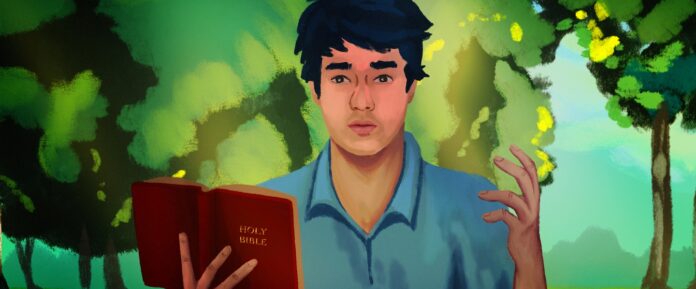People who in all sincerity set out to do God’s work are, of course, also doing their own. Chau, who was raised in Washington state, had a longtime fascination with adventure stories, especially those set in remote areas little explored by people from the industrialized world. As he grew up, Chau became a zealous outdoorsman and combined this interest with fervent faith. Dreaming of taking the Gospel to the least hospitable of climes, he developed an approach that might be described as extreme Christianity.
He could have been a missionary just about anywhere in the world, but Chau fixated on North Sentinel Island, a small outcropping in the Andaman chain. It’s legally off limits to outsiders, in part to prevent the introduction of diseases against which the residents lack immunity. The isle is overseen by India, which has a policy of not prosecuting islanders for killing interlopers.
As was widely reported in 2018, Chau’s mission did not work out well. On his second visit to North Sentinel, the 26-year-old was slain, according to the fisherman who transported Chau to the island. His body has not been recovered.
Chau’s trip to North Sentinel and other aspects of the story that weren’t recorded on video are presented in animated sequences. The painting-like style seems designed to recall the books that so influenced the missionary as a child.
McBaine and Moss couldn’t interview Chau, but they did get access to his diary and also pulled a few of his posts from social media. The only cooperation they received from family members was a letter from his father, Chinese-born psychiatrist Patrick Chau, who denounces missionary fervor. Excerpts from the diary and letter are read in voice-over by actors. Chau’s American-born mother and his two siblings did not participate.
As it moves to its foregone conclusion, the somewhat overstuffed documentary indulges many asides. There are even clips from the original “King Kong,” on the theory that Skull Island was inspired by the Andamans. Although the focus eventually returns to Chau’s disastrous undertaking, the asides gradually take over. The film expands into a debate on the ethics of missionary Christianity.
Interestingly, many of Chau’s Christian friends and associates, while admiring of him, don’t endorse his actions. He “was pursuing a fantasy,” says one. Yet others insist that his endeavor was entirely commendable. To not tell people about Jesus is a “violation of their human rights,” says Pam Arlund, director of training for missionary group All Nations International, which prepared Chau for his plan.
As a counternarrative, the movie introduces linguist and former missionary Dan Everett. He lived for years among Brazil’s Pirahã people, learning their language with the goal of converting them to Christianity. He came to feel guilty, and ultimately abandoned not only his mission but also his religion. Everett’s descriptions of the Pirahã’s utter mystification at the idea of Jesus suggest what Chau’s conversations on North Sentinel might have been like, had he learned the native language and lived long enough to attempt to proselytize.
Among the few outsiders to encounter the Sentinelese was British naval officer Maurice Portman, a colonial administrator in the Andamans in the late 19th century. He visited the island and kidnapped four children and two adults; the latter promptly died of illness. The children were then sent back to the island, where they almost surely told stories that are passed down to this day. When John Chau came to fight for their souls, the Sentinelese were fighting for their lives.
PG-13. At the Angelika Film Center Mosaic and Angelika Pop-Up. Contains full nudity, some violence, mature thematic elements and sexual references. 103 minutes.



